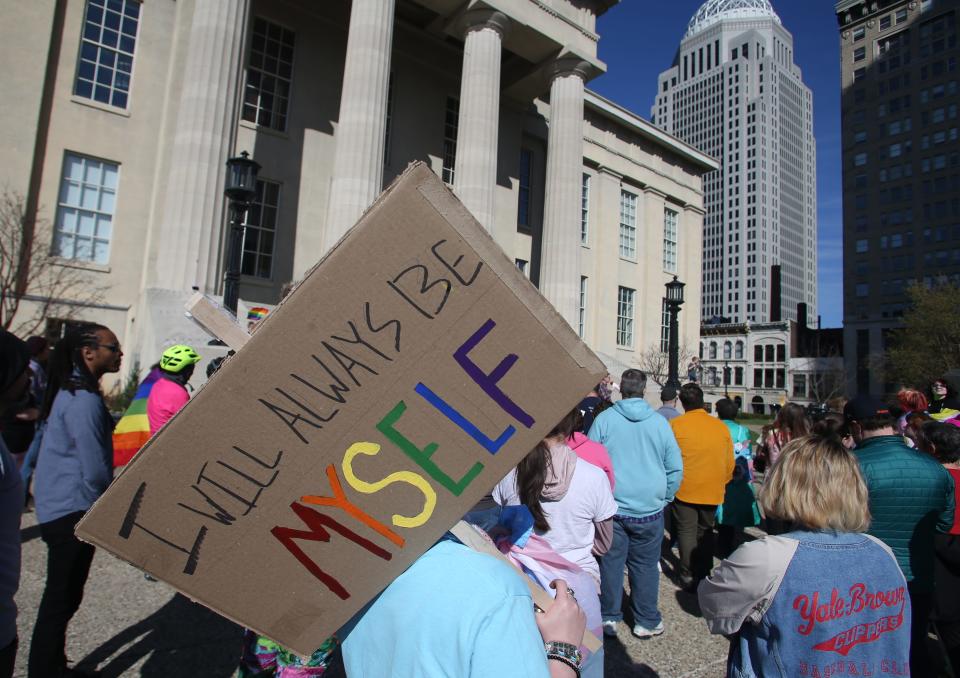U of L was right to protect hateful anti-queer demonstration. Free speech is everyone's right.
In late September, a group of anti-queer preachers occupied the designated “free speech zone” on U of L’s public campus for two days. The protestors’ signs featured Westboro classics, such as “Repent to Jesus or burn” and “Transgender: Liars, Insane, Psychotic, Murderers, Women Haters.” Students and organizations on campus mobilized, surrounding the protestors with messages of love, acceptance and music to drown out the hateful speech. As a queer student at U of L, I admire and appreciate that my peers opposed the preachers’ hate. In their opposition, one question began circulating among U of L’s student body for the remainder of the semester.
How is hateful speech allowed on our U of L campus?
This question has ignited a chain reaction across campus: petitions arose to remove the preachers from campus, calls were made to administration to deny them entry, and, soon thereafter, students’ ire turned towards the University. My peers’ passion is justified – I’m passionate too – but these frustrations with our administration are misconstrued.
It may seem that I, a queer student, am advocating for bigoted preachers on our campus. I am not. The truth, however, is that preventing lawful demonstrations on a college campus – traditionally hallowed ground in terms of discourse, dissent and deliberation – infringes upon another’s constitutional right to free speech, even if one finds the ideas and viewpoints being spoken personally disagreeable.
Pride is personal. Pride is complex and pride different for every LGBTQ person.
Dean of Students, Michael Mardis, and Vice President of Institutional Equity, Lee Gill, released an email statement to the student body after the protestors left, saying “The University of Louisville community finds this type of message deplorable. However, as a state institution bound by law and committed to the principles of the First Amendment, the university is required to provide access to individuals and groups that are not part of the campus community who wish to engage in speech activities.” The University may not be able to deny the expression of speech, but they are able to restrict the time and place it is expressed, which the University did by containing the preachers in a designated zone.
Let’s be clear: the preachers’ speech was certainly hateful, but it was not hate speech. Hate speech has no legal definition, and therefore provides no grounds for prohibiting offensive language on campus. So, our question of “How is this allowed?” is moot, because we already know: the University of Louisville is a government institution funded by tax dollars, and public universities cannot restrict a group’s expression of speech. This mandate is simply the charge of public institutions of higher education.

Students must rise above hateful speech
We should, instead, ask the question “What do we do with this?” To consider Michelle Obama’s counsel, how can we rise above what they have laid so low before us? We cannot direct our energy towards combating a phantom definition of language that could potentially offend us, as silence would ultimately stifle public deliberation. No, instead we must use this opportunity to solidify our place in the world.
I remember the first time I had to rise above hateful speech. I was only 13, and another boy scout in my troop called me a string of cruel words. I felt the most incredible shame. My dad came to my rescue, condemning the boy’s hateful speech, and told me: “I know you, God knows you, and you know you; we all know you are not those words.”
Kentucky is queer. Get used to it. Anti-LGBTQ extremists don't represent this state.
I have experienced the receiving end of hateful, homophobic language more often than anyone should. Such moments are, ultimately, moments of identity. There is a long-standing tradition in the LGBTQ+ community of catching insults that are thrown at us and wearing them with pride instead of shame; we reclaim what they use in hate and transform it into something good. We own it because we rise above it, because we go high.
I get to decide who I am
That bully, like the preachers, was trying to define my queer identity by telling me who I am. Being faced with someone else’s perception of our identity allows us to take the power of definition into our hands: I am not what you say I am – I am what I say I am. The same goes for you, Dear Reader.
Public deliberation is enshrined not only in our constitution but in the very foundations of academia – it is the very reason for professors' tenure – and much of our liberties are owed directly to the contributions of free speech. The provisions of the First Amendment that allow me to celebrate my LGBTQ+ identity every Pride Month are the same provisions that allow preachers to spew abhorrent language, professors to research, and student bodies to stand in defiance of hate. We cannot have one without the other; it is all or nothing. This is the tedious yet essential balance of academia and America.
The function of college is to prepare us to step into the world, but education cannot prepare us if it stifles dissent. Experiencing public deliberation allows us to learn how to deal with hurtful, hateful speech in the future: I know that I will experience homophobia for the rest of my life, so choosing temporary comfort instead of equipping myself with the tools and methods to continue to reclaim my queer identity is self-abandonment in the long run. Dismissing a learning opportunity, despite my discomfort, will only help those who wish to define who I am for me.

Spencer Adkins, a Marketing major with a minor in Public and Professional writing, is passionate about representing Queer voices in student affairs as he serves in the Student Government Association at the University of Louisville. Beyond graduation, he hopes to serve the Commonwealth through civic engagement to elect legislators who will serve the interests of LGBTQ+ Kentuckians.
This article originally appeared on Louisville Courier Journal: Universities protect freedom of speech even if the message is hateful

